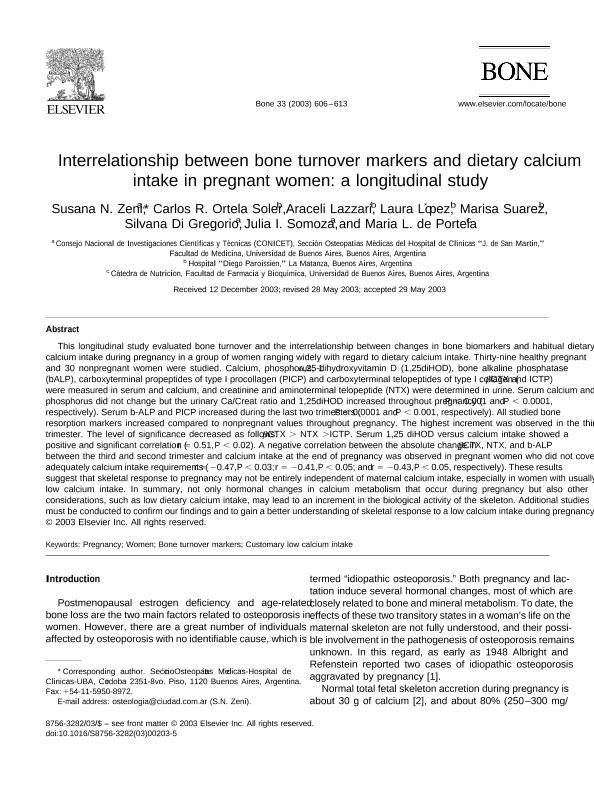Artículo
Interrelationship between bone turnover markers and dietary calcium intake in pregnant women: A longitudinal study
Zeni, Susana Noemi ; Soler, Carlos R. Ortela; Lazzari, Araceli; Lopez, Laura Beatriz; Suarez, Marisa; Di Gregorio, Silvana; Somoza, Julia Isabel
; Soler, Carlos R. Ortela; Lazzari, Araceli; Lopez, Laura Beatriz; Suarez, Marisa; Di Gregorio, Silvana; Somoza, Julia Isabel ; Pita Martín de Portela, María Luz
; Pita Martín de Portela, María Luz
 ; Soler, Carlos R. Ortela; Lazzari, Araceli; Lopez, Laura Beatriz; Suarez, Marisa; Di Gregorio, Silvana; Somoza, Julia Isabel
; Soler, Carlos R. Ortela; Lazzari, Araceli; Lopez, Laura Beatriz; Suarez, Marisa; Di Gregorio, Silvana; Somoza, Julia Isabel ; Pita Martín de Portela, María Luz
; Pita Martín de Portela, María Luz
Fecha de publicación:
10/2003
Editorial:
Elsevier Science Inc
Revista:
Bone
ISSN:
8756-3282
Idioma:
Inglés
Tipo de recurso:
Artículo publicado
Clasificación temática:
Resumen
This longitudinal study evaluated bone turnover and the interrelationship between changes in bone biomarkers and habitual dietary calcium intake during pregnancy in a group of women ranging widely with regard to dietary calcium intake. Thirty-nine healthy pregnant and 30 nonpregnant women were studied. Calcium, phosphorus, 1α,25-dihydroxyvitamin D (1,25diHOD), bone alkaline phosphatase (bALP), carboxyterminal propeptides of type I procollagen (PICP) and carboxyterminal telopeptides of type I collagen (βCTX and ICTP) were measured in serum and calcium, and creatinine and aminoterminal telopeptide (NTX) were determined in urine. Serum calcium and phosphorus did not change but the urinary Ca/Creat ratio and 1,25diHOD increased throughout pregnancy (P < 0.001 and P < 0.0001, respectively). Serum b-ALP and PICP increased during the last two trimesters (P < 0.0001 and P < 0.001, respectively). All studied bone resorption markers increased compared to nonpregnant values throughout pregnancy. The highest increment was observed in the third trimester. The level of significance decreased as follows: βCTX > NTX >ICTP. Serum 1,25 diHOD versus calcium intake showed a positive and significant correlation (r = 0.51, P < 0.02). A negative correlation between the absolute change in βCTX, NTX, and b-ALP between the third and second trimester and calcium intake at the end of pregnancy was observed in pregnant women who did not cover adequately calcium intake requirements (r = -0.47, P < 0.03; r = -0.41, P < 0.05; and r = -0.43, P < 0.05, respectively). These results suggest that skeletal response to pregnancy may not be entirely independent of maternal calcium intake, especially in women with usually low calcium intake. In summary, not only hormonal changes in calcium metabolism that occur during pregnancy but also other considerations, such as low dietary calcium intake, may lead to an increment in the biological activity of the skeleton. Additional studies must be conducted to confirm our findings and to gain a better understanding of skeletal response to a low calcium intake during pregnancy.
Palabras clave:
BONE TURNOVER MARKERS
,
CUSTOMARY LOW CALCIUM INTAKE
,
PREGNANCY
,
WOMEN
Archivos asociados
Licencia
Identificadores
Colecciones
Articulos(INIGEM)
Articulos de INSTITUTO DE INMUNOLOGIA, GENETICA Y METABOLISMO
Articulos de INSTITUTO DE INMUNOLOGIA, GENETICA Y METABOLISMO
Citación
Zeni, Susana Noemi; Soler, Carlos R. Ortela; Lazzari, Araceli; Lopez, Laura Beatriz; Suarez, Marisa; et al.; Interrelationship between bone turnover markers and dietary calcium intake in pregnant women: A longitudinal study; Elsevier Science Inc; Bone; 33; 4; 10-2003; 606-613
Compartir
Altmétricas



